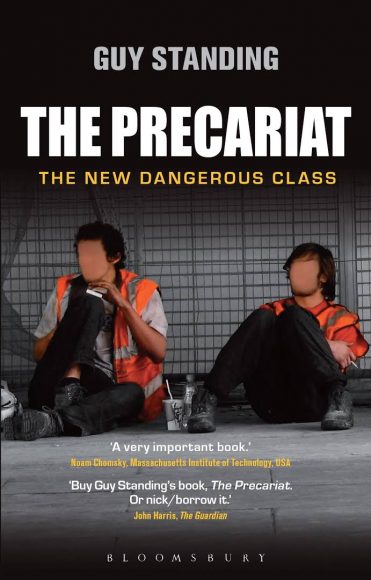The Precariat. The New Dangerous Class, Guy Standing, Bloomsbury Academic, 2015
Precariat is a neologism made up of the words ‘precarious’ and ‘proletariat.’ Guy Standing, the author of The Precariat. The New Dangerous Class, hailed by Noam Chomsky as “a very important book,” takes great pains to define its meaning. He explains that it is not the lumpenproletariat of Marxian theory nor is it a class as such. Rather, he elaborates, it is an emerging class that does not have a unified identity, and hence is often at odds with itself. Standing is quite clear when he says that the precariat is “the undertow of globalisation.” He also blames globalization for the fragmentation of class structures into the following: 1) elite, 2) salariat, 3) proficians (combining professionals and technicians, 4) shrinking core of manual employees and 5) a growing precariat, otherwise known as the unemployed or the dregs of society. He makes his point in great detail in the following seven chapters.
I –The precariat
The precariat is at the mercy of market forces and tensions that pit different groups of people against each other. Many of its members are attracted to populist and neofascist messages which “is why the precariat is the dangerous class and why a ‘politics of paradise’ is needed that responds to its fears, insecurities and aspirations.”
2 – Why the precariat is growing
The precariat is growing because “there was a crude social compact in the globalisation era.” Workers were required to accept flexible labour in return for job stability. Living standards were maintained through debt, which led to the crash of 2008. When people’s incomes fell below levels required to pay the mortgages they were encouraged to take, a new layer joined the precariat.
3- Who enters the precariat?
The author mentions several groups: women, youth, old-agers, early-retirees, migrants, ethnic minorities, the disabled and the criminalized. This complex chapter merits a careful reading.
4 – Migrants: victims, villains or heroes?
Standing does not hesitate to state that migrants have become the new denizens of society, as distinct from citizens. This category includes temporary and seasonal migrants as well as long-term migrants. He calls this group “the light infantry of global capitalism.”
5 – Labour, work and the time squeeze
In this chapter, the author defines the nature of work and the tension between work and leisure. He bemoans the fact that the precariat is under time-stress, and hence is practically unable to do creative work, or engage in political activity. “The workplace is every place, diffuse, unfamiliar, a zone of insecurity.”
6- Politics of inferno
Standing says it all in this scathing statement: “The neoliberal state is neo-Darwinist, in that it reverses competitiveness and celebrates unrestrained individual responsibility with an antipathy to anything collective that might impede market forces.”
7- Politics of paradise
Chapter 7 is perhaps the most important chapter in this book. The author calls for revisiting the trinity of liberty, equality and fraternity in developing a progressive agenda with the precariat in mind. In order to achieve the freedom and basic security that the precariat craves, Standing calls for making denizenship fair, recovering identities, rescuing education, commodifying labour fully, reinstating occupational freedom, re-establishing workers’ rights and combatting workfare and conditionality. He also asks for associational freedom, a basic income, redistribution of security as well as of financial capital, and the ability to control time. Above all, recovering the commons and leisure are important elements in a politics of paradise.
Guy Standing concludes his incisive and cogent book by stating categorically:
“The precariat is not victim, villain or hero – it is just a lot of us.”








